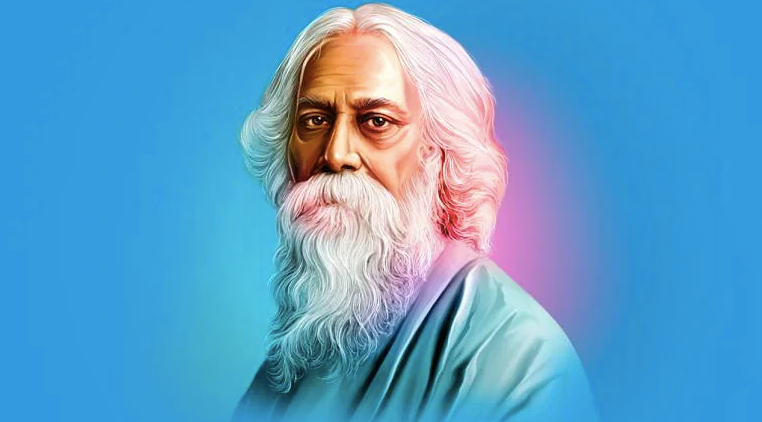Rabindranath Tagore Poems: The legendary writer and poetic philosopher Rabindranath Tagore was born in Calcutta, India in 1861. He was honored with Nobel Prize for Literature in 1913 and was the first non-European to receive such an honor.
Rabindranath Tagore wrote in English and Bengali, experimenting with various genres of literature. He was a poet, short-story writer, novelist, playwright, essayist, spiritualist, educationist, composer, lyricist, and singer.
Tagore’s Gitanjali: An Anthology of Poems is a celebrated gift of labour to humanity. In his late sixties, Tagore became fascinated with the visual arts, creating over 2500 drawings and paintings before his death.
Rabindranath’s lyrical compositions were chosen as the national anthems by two nations: India’s “Jana Gana Mana” and Bangladesh’s “Amar Shonar Bangla”.
Here are some best poems of Rabindranath Tagore:
Leave This
Leave this chanting and singing and telling of beads!
Whom dost thou worship in this lonely dark corner of a temple with doors all shut?
Open thine eyes and see thy God is not before thee!
He is there where the tiller is tilling the hard ground
and where the pathmaker is breaking stones.
He is with them in sun and in the shower,
and his garment is covered with dust.
Put off thy holy mantle and even like him come down on the dusty soil!
One of Rabindranath Tagore poems, Leave This addresses the hypocrisy within our hearts in the name of religion.
Where the Mind is Without Fear
Where the mind is without fear and the head is held high;
Where knowledge is free;
Where the world has not been broken up into fragments by narrow domestic walls;
Where words come out from the depth of truth;
Where tireless striving stretches its arms towards perfection:
Where the clear stream of reason has not lost its way into the dreary desert sand of dead habit;
Where the mind is lead forward by thee into ever-widening thought and action–
Into that heaven of freedom, my Father, let my country awake.
The poem titled ‘Where the Mind is Without Fear’ talks about the boundless power of human knowledge, the essence of true freedom
Also, Check: Rabindranath Tagore Jayanti
Last Curtain
I know that the day will come
when my sight of this earth shall be lost,
and life will take its leave in silence,
drawing the last curtain over my eyes.
Yet stars will watch at night,
and morning rise as before,
and hours heave like sea waves casting up pleasures and pains.
When I think of this end of my moments,
the barrier of the moments breaks
and I see by the light of death
thy world with its careless treasures.
Rare is its lowliest seat,
rare is its meanest of lives.
Things that I longed for in vain
and things that I got
—let them pass.
Let me but truly possess
the things that I ever spurned
and overlooked.
The “Last Curtain” converses about the vulnerability that one feels at the time of death
Let Me Not Forget
If it is not my portion to meet thee in this life
then let me ever feel that I have missed thy sight
—let me not forget for a moment,
let me carry the pangs of this sorrow in my dreams
and in my wakeful hours.
As my days pass in the crowded market of this world
and my hands grow full with the daily profits,
let me ever feel that I have gained nothing
—let me not forget for a moment,
let me carry the pangs of this sorrow in my dreams
and in my wakeful hours.
When I sit by the roadside, tired and panting,
when I spread my bed low in the dust,
let me ever feel that the long journey is still before me
—let me not forget a moment,
let me carry the pangs of this sorrow in my dreams
and in my wakeful hours.
When my rooms have been decked out and the flutes sound
and the laughter there is loud,
let me ever feel that I have not invited thee to my house
—let me not forget for a moment,
let me carry the pangs of this sorrow in my dreams
and in my wakeful hours.
“Let Me Not Forget” expresses the melancholic emptiness behind missing beloved ones.
Freedom
Freedom from fear is the freedom
I claim for you my motherland!
Freedom from the burden of the ages, bending your head,
breaking your back, blinding your eyes to the beckoning
call of the future;
Freedom from the shackles of slumber wherewith
you fasten yourself in night’s stillness,
mistrusting the star that speaks of truth’s adventurous paths;
freedom from the anarchy of destiny
whole sails are weakly yielded to the blind uncertain winds,
and the helm to a hand ever rigid and cold as death.
Freedom from the insult of dwelling in a puppet’s world,
where movements are started through brainless wires,
repeated through mindless habits,
where figures wait with patience and obedience for the
master of show,
to be stirred into a mimicry of life.
One of the poems of Rabindranath Tagore, “Freedom” seems to be written exclusively for the Independence struggle of India.


